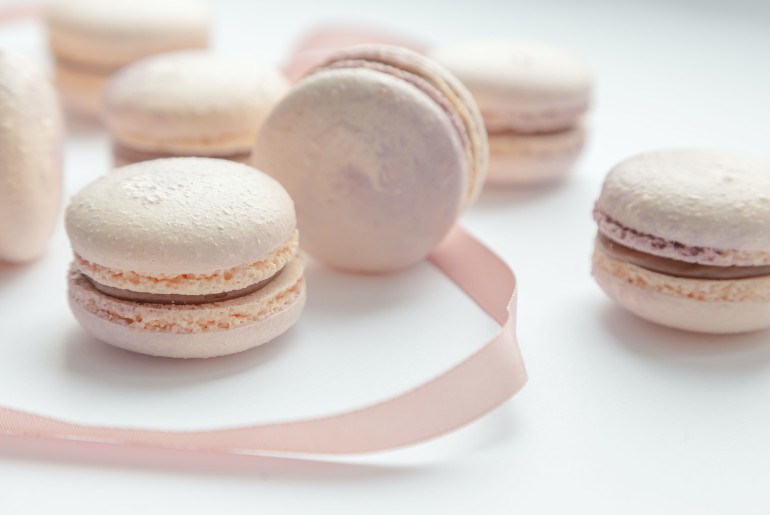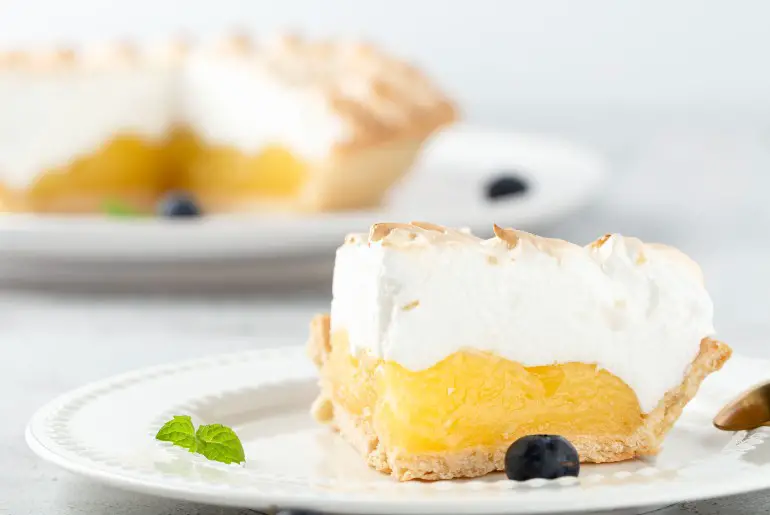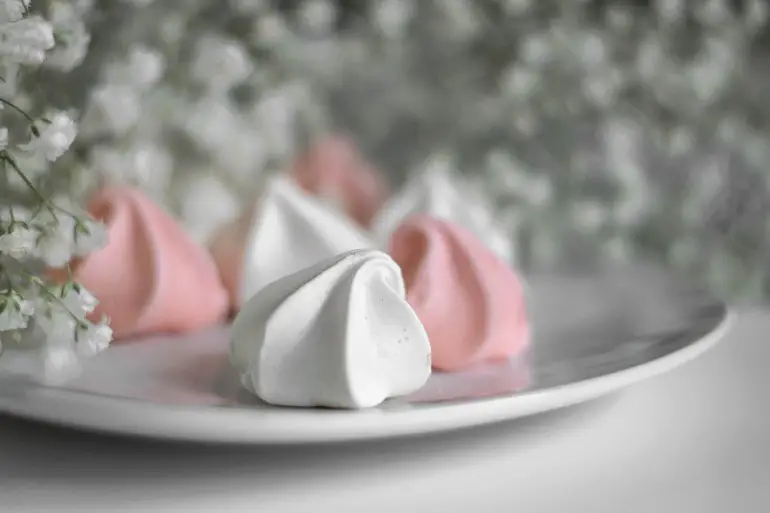What is the Purpose of Egg Whites in Baked Goods?
Beaten egg whites add volume to baked goods. The beaten eggs foam and become light and airy, and you then fold them into the batter. This results in a lighter, fluffier product; you will often see beaten egg whites in recipes for waffles and some types of cake.
You can also use beaten egg whites to make a soft meringue to put on a lemon meringue pie or baked Alaska. Alternatively, you can bake meringue until it is crispy such as a pavlova or meringue cookies. Or, you may add other ingredients like nut flour to make a meringue-based treat, such as macarons or dacquoise.
The Science Behind Meringue
Egg whites have the incredible ability to increase 6-8 times in volume. Egg whites are about 90% water and 10% protein. When beaten or whipped, the proteins in the egg whites denature (unfold) into smaller protein strands. This leaves the protein molecule with a hydrophobic (water-repelling) and hydrophilic (water-attracting) end.
The protein strands form a film between the air and the water in the egg whites. Bubbles form with the hydrophilic end pointing toward the water and hydrophobic toward the air. When meringue is baked, the proteins coagulate and create a solid network around the trapped air. This results in crispy, fluffy meringue.
How to Know When You Have Stiff Peaks
So when you first beat egg whites, you go from foamy whites that don’t hold their shape to “soft peaks.” Soft peaks are you turn your whisk upside down, and the peaks are barely starting to hold. They are very soft and melt back into themselves after just a second.
Next, they get to “firm peaks,” when you turn the whisk upside down, the peaks hold and will have more distinct ridges. However, most of the tip will still fold over.
Lastly, you get to “stiff peaks.” Now, when you turn the whisk upside down, the peaks will stick straight up without collapsing or with just the top of the tips folding slightly. They should be thick and heavy with a glossy, moist appearance. If you rub the meringue between your fingers, the sugar should be dissolved and should not feel gritty. If you’re looking for a visual of soft, firm, and stiff peaks, check out this video on YouTube.

Why isn’t my meringue getting stiff peaks?
The answer to this question is tricky because there are numerous reasons your meringue isn’t working, including fat getting into fat has gotten into your mixture, adding sugar too quickly, not adding an acid, or not beating for long enough. Read on to learn the top 7 reasons why you can’t get your meringue to stiff peaks.
1. You Haven’t Beaten Your Meringue Long Enough
Thankfully, this is a fixable problem. If you are beating your meringue with a stand or hand mixer, it can take up to 10 minutes or so to achieve stiff beaks. Also, if you are trying to hand beat your meringue or beating them at a slow speed, they will take quite a while to get stiff peaks.
Start beating your egg whites at slow speed but then increase your mixer to medium speed as you add sugar, and they begin to stiffen. If you are beating your egg whites by hand, it can take 20 minutes or so (and quite a bit of arm strength and endurance) to get them to stiff peaks.
2. You’re Using Too Small of a Bowl
If beating three egg whites or fewer, use a small bowl. But if you’re beating four egg whites or more, you will want a large, deep bowl. This allows your whisk to reach more surface area of the egg whites to achieve stiff peaks more quickly.
3. The Egg Whites are Cold
Your meringue will whip up more quickly and reach its greatest volume if eggs are at room temperature. Room-temperature egg whites have decreased surface tension, allowing them to foam more easily. Egg whites are easiest to separate when cold, so separate your whites, then let them sit at room temperature for 30-60 minutes. Cold egg whites will still whip up, but it will take longer, and it is easier to overbeat them.
4. You’ve Skipped the Acid
Acid, whether vinegar, lemon juice, or cream of tarter, will help you make a stiff, stable meringue. Acid makes proteins less likely to interact, preventing too many protein strands from connecting. It allows the foam to form more slowly, giving you a stronger and more stable network around the air bubbles giving you the perfect stiff peaks. It also helps prevent overbeating.
5. Fat Has Gotten In
When it comes to making meringue, fat is your greatest enemy. Just like protein, fat has a hydrophobic and hydrophilic end. The fat competes with the protein to form the film around the air bubbles. The problem is that fat, unlike protein, won’t create the bonds needed to make a stable structure to hold the network of gas bubbles.
Even a bit of fat, a little egg yolk, or some fat left in the bowl from something else you’ve made will completely ruin your meringue. Make sure there is no yolk in your whites and that your mixing bowl is spotless.
6. The Sugar Was Added Too Fast
Sugar is critical for making meringue. The sugar helps coat the air bubbles, making the foam stronger and stiffer and preventing overbeating. While a single egg white can hold 1/4 cup (50 grams) of sugar, it needs time for the sugar to dissolve into the meringue.
Be sure to add your sugar slowly, giving time for it to dissolve before adding more sugar. If you add sugar too quickly, the egg whites cannot dissolve it quickly enough. This will make your foam fall, and you’ll have difficulty achieving stiff peaks.
7. You Added Salt
While many recipes call for salt in meringue, you must be careful. Salt makes the proteins coagulate. So you may have to beat the egg whites longer to unwind the protein strands so they can form the thin film needed to encase air bubbles and make the egg whites foam. Salt isn’t necessary in meringue but if you add it, do so after you’ve gotten your meringue to stiff peaks.
Can You Overbeat Meringue
Absolutely. If beaten too long, the protein bonds in the egg whites break, the air escapes, and the foam loses its volume. If you overbeat your meringue, you’ll have a dry, grainy, lumpy meringue. Unfortunately, you cannot fix overbeaten meringue. It will have to be tossed and started over. Make sure to follow the recommendations listed above to avoid overbeating your egg whites.

Why Is My Meringue Weeping?
Weeping is when brownish drops of liquid appear all over the top of baked meringue, or a layer of moisture forms between the top of the pie and the base of the meringue. This can be due to not adding an acid, over-or undercooking your meringue, or excess humidity.
1. You Skipped the Acid
While forming a protein network is critical when making meringue, it can break the protein network if the bonds are too strong. This essentially causes the water to be squeezed out of the meringue, causing it to “weep” (aka syneresis). Weeping can happen if you don’t add cream of tartar or another acid. The acid helps prevent too many bonds from forming, creating a stable network that keeps water in the meringue where it’s meant to be.
2. It is Over-or Undercooked
The meringue is undercooked or overcooked. To avoid undercooking, add your meringue while the pie filling is piping hot. This allows the steam from the filling to rise and move through the meringue rather than pooling underneath.
Once your meringue has turned light brown, remove the pie from the oven to avoid overbaking.
3. Too Much Humidity
It’s a humid day. Humidity can make the sugar absorb the extra moisture in the air. This can turn the meringue sticky or cause it to form tiny beads of syrupy liquid. Make meringue pie on a dry, sunny day and allow it to cool fully before you slice and serve it. Also, serve your pie on the day you make it, as storing it in the fridge (which is very humid) overnight can also cause it to weep.

Why Aren’t My Meringues Crispy?
Meringue cookies are delightful! They are crispy and airy and melt in your mouth. So it can be pretty disappointing to have gummy, chewy meringues. A couple of different things can cause chewy meringues.
1. It’s too Humid
As I said above, humidity is the enemy of meringue. It can make it difficult to dry your meringues properly and get them crispy. Try to bake your meringues on a sunny, dry day when possible.
If your meringues are still sticky, you can put them back in the oven for another 10 minutes to crisp up a bit. You can also add 1 tsp of cornstarch to the sugar on a humid day to help keep your meringues dry.
2. They Haven’t Been Baked Long Enough
It is essential to bake meringues at a low temperature for a long time. They also need time to dry after baking. Turn the heat off and allow them to finish drying in the oven for at least a couple of hours or even overnight.
3. The Meringue Wasn’t Stiff Enough
If you don’t get your meringue to stiff peaks, you’ll not have crispy, airy meringues. As stated earlier in the article, you’ll want your meringue to be thick and glossy, and when the whisk is pulled from the meringue and turned upside down, the meringue should hold its shape and stick straight up without falling over.
Now you’ve got the tools you need to make the perfect meringue! If you want to try an egg-free meringue, I recommend checking out my article on aquafaba and aquafaba meringue.
Happy baking!





